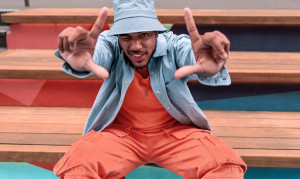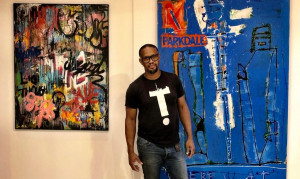A little over twenty years later, Jayde played an integral role for the Canadian national team that not only beat The States but did so en route to claiming an Olympic gold medal.
In the final against the second-highest ranked team in the world, Sweden, Jayde started on the bench before being subbed on in extra time. Representing your country, stepping onto the pitch in a gold-medal game — of your first Olympics no less — is an intense and unique experience few people get to have. But for Jayde, it was a moment she’d been working towards her whole life.
Jayde is just 20-years old, and a junior at the University of Michigan. She’s a first-generation Canadian, born and raised in Pickering to parents of Chinese and Dominican descent. Jayde’s father, Tony, played soccer in his native Dominica and taught Jayde the fundamentals of the beautiful game from a young age. She spent hours training on her own and with her dad even after practice with her teammates. In addition to developing her skills, Jayde said constantly practicing taught her important attributes like grit, being humble, cooperating and mindfulness. She said soccer, her parents, teammates and coaches have taught her “how to be a proper human being” and remind her that she’s a person before a soccer player.
Jayde is part of an exciting group of young players who are tasked with ushering Canadian women’s soccer into the next generation but we started our conversation talking about one of the most painful losses Canada’s national team has had in recent history.
In the build-up to the semi-final match against the United States, there was a lot of talk about exercising the demons of the 2012 Olympics and changing the colour of the medal. I watched the match and it broke my heart the way we went out. Do you have any kind of emotional connection to it?
I think I watched the match and I watched the national team at that time but I remember the one in Brazil more clearly. It's devastating to lose to the United States regardless because of the rivalry we have. But the emotion of beating them this time, I think it was more for the veterans because some of them have been waiting 20 years for a gold medal. Not to mention our history with the U.S., it’s always a battle and we're always on the short end. The emotion that they displayed was an example of what it meant.
I know that you weren't able to play in that game because of a suspension but what was the atmosphere of the team leading up to that game and then after the game when we won? We (laughs nervously) I mean you won.
We are fine, it’s about all of Canada. Leading up to the game I think a lot of teams often are scared of the States because of how many wins they have under their belt so, it can be quite threatening, but there was like zero fear. There wasn’t anything negative coming in from the team, it was all about “this is the time to beat the U.S.” I think everybody in that locker room felt it. When we beat the U.S., you saw the tears, you saw the emotion, the hugging, the screaming. You could physically see how much that win significantly impacted the players.
In the final against Sweden, you came off the bench in extra time, which could be seen as more nerve-wracking than starting, especially in extra time with the possibility of penalties looming over you. Can you take me through the conversations you were having and what went through your mind in the moments leading up to and immediately after running onto the pitch?
Yeah, you're right in the sense that it's actually more nerve-wracking coming off the bench just because your first touch is going to be when the game is most hectic. Or you don't know how the game is going, you could be riding the wave or you can be getting blocked, you could be going into the game up 2-0 in which I guess would ease the nerves more. But going into that game it was quite nerve-wracking. They prepare you for that in the sense of, you know your role when you come on and what you have to do.
I think another thing that our team implemented is that whatever happens, the team has your back. So even if you're not starting, you're making sure you’re ending the way that you want. That was my idea for it.
Only four Canadian teams have ever won gold medals at the Summer Games, and as we just talked about, to win you had to beat the States. What is the significance of that win?
I didn't know the statistics behind winning the gold medal so I think that alone is very significant, just winning the medal. Again, I go back to the veterans because you could see on their faces how much it meant to them. I think for me, it being my first Olympics and winning gold, there's no better Olympic debut. It’s more than anything that you could ask for because personally if I got any metal, I would be happy with that. But just seeing how much it meant to the veterans, and especially 'Sincy' (team captain Christine Sinclair) because she's constantly breaking records, she's constantly putting Canadian women’s soccer on the map. I think it was a team effort that we could give back to her because she's given so much for Canadian soccer.
I watched the interview with Christine Sinclair and Stephanie Labbé about the gold-medal win and one of the things that stuck with me is both of them despite just achieving this career-defining accomplishment, their answers were focused on development and Canada putting more money into infrastructure so that this success is not a one-off.
{https://www.youtube.com/watch?v=yTbdAdIRNsY}
Can you tell me about your transition from soccer being a hobby to something you knew you wanted to pursue professionally?
The moment that I realized that I was good at soccer is when I was with my dad at the fields and I realized that nobody was doing what we were doing. Nobody was out there every day after a training session putting in the work even though we just finished a club training session. When I realized that at a young age I realized that this is how you become good, you put in the extra hours aside from what is given at a club or with coaches. You put in the work when no one is watching and that's definitely what has helped me get to where I am today.
You could ask my dad, I'm sure he'll tell you he saw that I had the fundamentals of soccer down-packed at a young age and he knew that if he stuck to teaching me when people weren't watching, I would grow through every game. And every game you saw more self-confidence, he saw more dominance, I used to be a midfielder, so, more goals at the time. That's when I realized that if I keep doing things like this, I can go far in soccer.
I’ve read that you put a lot of pressure on yourself and that you get very serious before games. What are some of the things you’re thinking about leading up to a game?
Personally, I can't go without listening to soca music. My dad played those songs in the car growing up, so, I would always listen to Soca music and it's kind of stuck with me, I can't go any game day without listening to it, it just lifts your energy and it gives you a good vibe. But I'm not someone who has to have a certain routine and if I don't follow that routine then all hell breaks loose; that's not me. For me, the biggest thing is when I get on the field, I just need to take a deep breath. And I find that when I do that, and then the whistle blows, I silence out everybody around me. There are some times I don't even recognize that there is a crowd. I couldn't recall anything that they’d scream or anything like that because it's just two teams, two nets and a ball.
Are there any artists or particular pump-up songs that after you hear them, you’re ready to go?
Dreams and Nightmares by Meek Mill. It’s a hardcore gangster type of song, so that has to fit into my soca playlist.
Stephanie Labbe, one of the heroes of the gold-medal game, gave you some advice during your first start for the senior team. What are some of the lessons you’ve learned from the veteran players on Team Canada? And who do you go to for advice and support?
The biggest mentor on that team is Sinclair, and she's a mentor to anybody, even the other veterans still look up to her. I went up to her during the Olympics when I was told that I was going to start against Chile, and I asked her what advice do you have because it's going to be my Olympic debut. She doesn't speak much but when she does is very impactful. She said, “It's just another game.” And in my head, I'm thinking “This can't be just another game, it's the Olympics, this is a big deal!” But she said, “It’s just another game, you have to play the same way that you’ve always played, and bring what you bring to the team again.”
And there was just something about the calmness in how she said it. She didn't feel the need to say a whole paragraph or make a big deal of the Olympics or the stakes on the line, there was none of that really. I think that showed me that she's a badass, she knew exactly what to say and what I needed to hear. That allowed me to feel that my team was really behind me.
The second biggest moment, as you mentioned, was that moment with Steph. She told me, “I know that you're hurting but it’s moments like this that define big players.” And after her saying that I went out and I assisted two goals and I played well in that second half. When I came off of the pitch and I played the way I did, that was the moment that the coach knew he was going to take me to the World Cup. So, I always wonder and can't help but think, “What if I just said ‘no, I'm in too much pain?' I would never have made the World Cup team, I wouldn’t be where I am right now, and my pathway would look different because of that moment. It just shows you the importance of what one person says can have and the impact that one person can have to help you with the rest of your career.
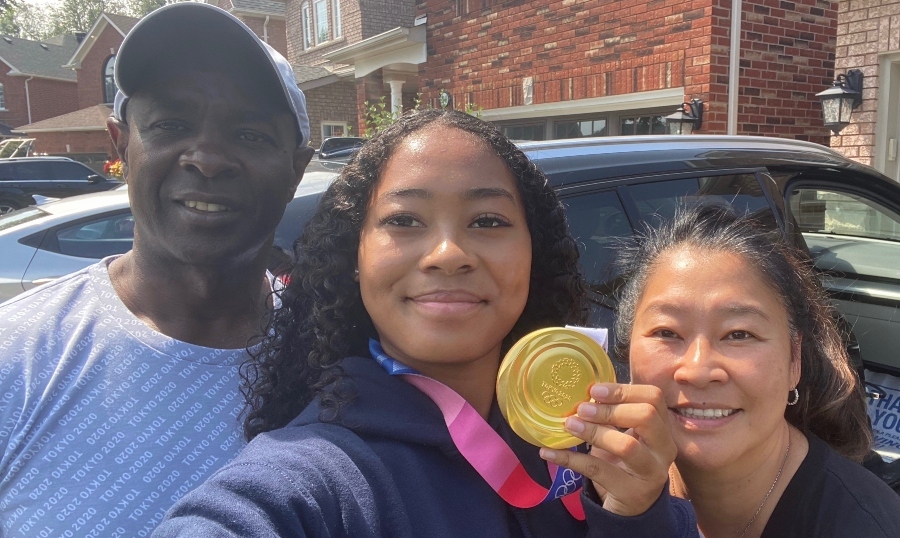
Tony and Jayde Riviere, and her mother, Emily Lui. (Photo Courtesy: Jayde Riviere)
As you mentioned, you played through the pain on your first start, you moved to Vancouver when you were 16, now you’re living in Ann Arbor away from your friends and family. How did you develop that mental toughness and confidence in yourself?
I think it goes back to my parents and what they taught me. I was an only child and both my parents worked full-time jobs, so I was a very independent kid. My dad told me that when I went to Vancouver, that I was going to school and soccer and that's all. And he told me to remember that I'm going to Vancouver to better myself as a player and I'm going there to keep my grades up so there was no slacking off. Because I took soccer so seriously from a young age, I didn't have the luxury of going to sleepovers with my friend or going to parties or even family events because I was dedicated to the sport.
So, when I went away, it obviously sucked leaving my parents but I was more ready than I thought. And I knew that if I did this and I gave it my all then this could be the start of something. I was 16 at the time and I wanted to make my parents proud, especially my dad because he put a lot of time into me. You hear about parents sometimes who don't have the luxury to go to the field with their kids and stuff like that. It makes you wonder what would happen if somebody, a parent or a coach, took some kid under their wing and taught them the fundamentals and gave them a chance, what would they look like now?
When you have moments of doubt or a bad game and you need something to lift your mood or give you support, who are some people you turn to?
If it's not my parents that I turn to, it's one of my coaches. One coach in particular that I’m very close with is Richard Alexander, he’s a coach for the Markham Soccer Club and he’s also a chiropractor. I have so many stories with him and he’s someone who I would wake up at 3 a.m. and just message about soccer when I was away at camps and I had a bad training session and I was bawling my eyes out because I'm thinking I'm gonna get cut the next day. Richard knows me like my parents do, if not better.
He helped a lot with my development; he used to make me train with his 2000s boys team and they were all like six feet tall, muscular. He gave them one rule and the rule was that they weren't allowed to bulldoze me. But playing with them, I learned soccer through different lenses, and the speed of play was different, the physicality was different, you had to have a different IQ playing with boys. So he is someone that I turn to for any type of advice. I still keep in contact to this day and when I went home, the first person I saw was him because that medal just represented everything that he put into me.
What did he say when you showed him the medal and had a conversation about the Olympics?
He said, “You did it!” and I said, “Yeah, we did it.” Richard loves to make monumental moments so when I went to his chiropractor’s office to get stretched out because I came off the plane less than 24 hours ago. So, I’m getting stretched, and my mom is there, and I was about to leave and he’s walking me out and then I see his entire girls program, like every team that he has, was outside with huge signs and everything. He loves to make an example of me and he took the time to train me, to fix me up when I’m hurt and it’s meant a lot and it means a lot.
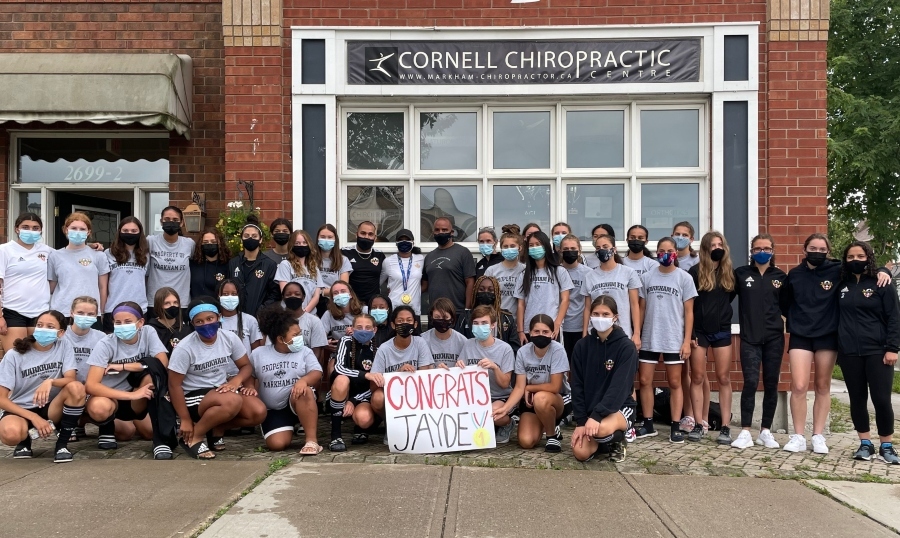
Jayde Riviere, former coach Richard Alexander, and members of the Markham Football Club. (Photo Courtesy: Emily Lui)
The final question that I have for you, and I apologize in advance because I remember being a student and I know this was one of the worst questions but what are you looking forward to in the future or what is the next goal that you're trying to reach?
Soccer-wise, I want to win a Big 10 Championship. That's something that I want to do not just for myself and tick it off my list but I want to do it for this team. I feel like I owe this team a lot because, in my freshman and sophomore year, I’ve been away at camps and the World Cup the whole time. I took a semester off my freshman year for an Olympics that never happened so in some ways, I feel like I let the team down because I was never physically there. So, now that I'm coming off the high of winning a gold medal, my next thing is I want to give back to this team by being 100% present and giving them everything that I have for my junior year.
The future is forever changing but academically, my goal since I was 14 is to finish my four years at Michigan and to get my degree in movement science. I’m not sure exactly what occupation I’d like. Movement science can open up a lot of doors for me in different fields. The soccer world is forever changing too because I can tell you that a couple of years ago, my mind wasn't set on playing in the NWSL (National Women’s Soccer League), it was always about going overseas. But they’ve ended up becoming a big league now and it's adding more teams, even big players from Europe are coming over now so I think the NWSL is going to be huge.
I personally would like to go to Europe, possibly to England to play for a team there because they're really big for women’s soccer in England. But now that we’ve won a gold medal, I think it's hard for people to ignore Canada. And there are talks of having a Canadian league for women so life will take me wherever it takes me but it’s safe to say that I have options.
Jayde and her Wolverine teammates kick off their 2021 Big Ten Women's Soccer Tournament against Penn State in the quarter-finals this Sunday at 1 p.m. ET. For more information on how you can watch the games visit bigtenplus.com for details.
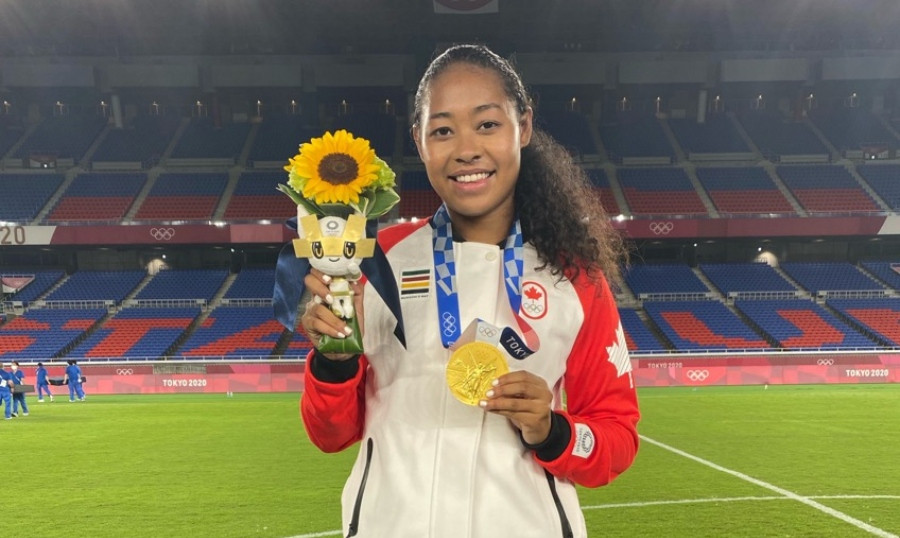
 By
By 




